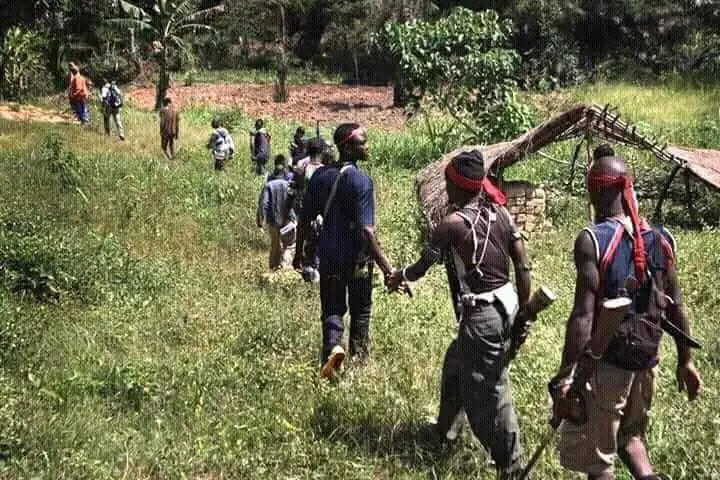
WHEN THE TIDE TURNS-The Unyielding Spirit of the Anglophone Population
For over 60 years, the Anglophone population in Cameroon has lived under systemic marginalization and repression. This has created a deep-seated resilience among the people, who have now overcome the fear of state violence.
Protests that began as calls for basic rights have transformed into a determined demand for justice and self-determination. The loss of fear reflects the population’s realization that dying in pursuit of freedom is a lesser evil than living under oppression, domination and subjugation.
The Toll of Conflict
The conflict has left a devastating mark on the Anglophone regions. Over 6,000 fighters and soldiers have died, alongside an uncountable number of civilians caught in the crossfire. Entire villages have been razed, schools closed, and hospitals shuttered. Over one million people have fled their homes, seeking safety in the bush or urban canters, while hundreds of thousands have crossed into neighbouring Nigeria. Refugee camps are overcrowded, and basic resources like food, water, and medical supplies are scarce. Families remain separated, with little hope of reuniting under current conditions.
A Mutual Desire for Peace
Fatigue is evident on both sides of the conflict. Fighters grow weary as resources dwindle and community support wanes. Similarly, Cameroonian soldiers face burnout and declining morale after years of deployment in hostile zones. Civilians, trapped between these two forces, yearn for a return to normalcy in peace and justice. Despite this shared desire for peace, trust between the government and the population remains fragile. Communities express hope for diplomatic solutions but remain cautious, fearing yet another cycle of broken promises and renewed violence.
The Misconception of Victory
While the intensity of fighting has decreased to a seven-year low, this lull does not signify a victory for the government. Many separatist factions have simply retreated to regroup and strategize. Meanwhile, the population views this period as a temporary reprieve, not an end to their resistance. Even without active fighting, communities resist government authority through non-cooperation and civil disobedience. Soldiers continue to patrol streets and harass residents, perpetuating resentment rather than fostering loyalty.
War Economy and Corrupt Alliances
The conflict has birthed a war economy driven by corruption and criminal enterprise. The Cameroonian government has tacitly encouraged alliances between military officials and certain separatist factions. These alliances facilitate kidnapping-for-ransom schemes, illegal timber extraction, and petroleum smuggling. In return, corrupt separatist commanders receive government protection, eroding the credibility of the independence movement. This war economy benefits select officials while devastating local economies and exploiting the suffering of ordinary citizens.
Erosion of Trust
Communities have grown increasingly distrustful of separatist factions involved in criminal activities. Kidnappings targeting students, clergy, and business owners have shifted public perception of some separatist groups from liberators to opportunistic criminals. Reports indicate that certain commanders, collaborating with military officers, have orchestrated these abductions for personal enrichment. Despite this, the population distinguishes between genuine fighters and corrupt leaders, supporting grassroots resistance while rejecting exploitation.
A Legacy of Corruption and Repression
Cameroon’s current climate of corruption can be traced back to the 1966 deployment of gendarmes to the Anglophone regions. Soldiers were encouraged to extort money from civilians, supplementing their already high salaries through bribery and intimidation. Over time, this evolved into an institutionalized system where soldiers enjoyed financial superiority over teachers, doctors, and other professionals. This strategy ensured military loyalty to the regime, preventing the risk of coups while fostering deep animosity between soldiers and the population they were meant to protect.
Military Corruption and Stability
The government’s deliberate policy of rewarding soldiers with unchecked power and financial incentives has created a class of untouchable military personnel. Soldiers openly demand bribes at checkpoints, raid villages for supplies, and detain civilians without cause. This system has disincentivized any attempts to overthrow the regime, as soldiers stand to lose their privileges if new leadership assumes power. This corruption trickles up, with high-ranking officials amassing wealth while overseeing a network of exploitation.
Political Elite and Corrupt Networks
High-level government officials operate under the same corrupt framework. Ministers are appointed with the explicit understanding that their personal enrichment is tolerated, provided they remain loyal to the regime. Those who fall out of favor face swift imprisonment on corruption charges, serving as convenient scapegoats for the government’s broader failures. This practice ensures the continued complicity of political elites, who fear the consequences of dissent. The recent co-opting of separatist leaders into this corrupt system reflects the government’s long-standing strategy of neutralizing opposition through bribery and coercion.
The Inevitable Shift
The government’s reliance on corrupt military officials and separatist leaders as “useful idiots” has bought temporary stability, but this fragile arrangement cannot last indefinitely. The tide will turn. The Anglophone population, increasingly disillusioned with both the government and rogue separatists, continues to seek genuine leadership. Technological advancements in communication and mobilization suggest that the next wave of resistance may be more organized and effective more deadly and more decisive.. When the inevitable tide turns again in future it will likely surpass the scale and intensity of the 2017-2018 military losses for Cameroon, as well as civilian deaths, marking a turning point that the Cameroonian government may not be prepared or planned for nor can withstand.
The Anglophone crisis underscores the undeniable truth that the aspirations of a people cannot be permanently repressed. It is imperative that meaningful dialogue, justice, and equitable governance take precedence before the situation escalates and once again spiral out of control.
Summary
The government’s reliance on corrupt alliances with some separatist leaders and commanders cannot suppress the population’s aspirations indefinitely. Lasting peace requires justice, inclusive dialogue, and equitable governance to prevent future escalations.

